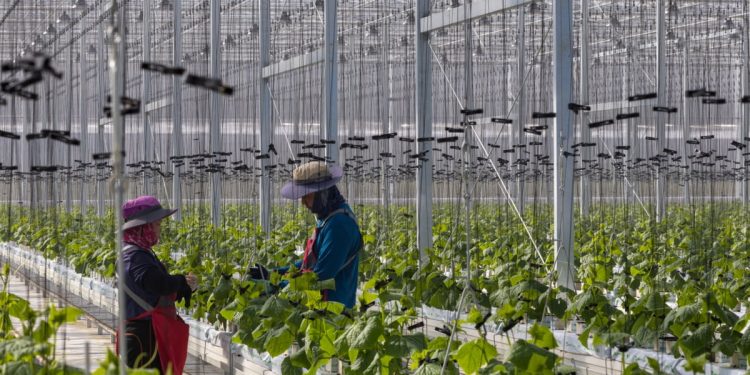#Agriculture #CropYield #PlantLighting #InnovativeFarming #SustainableAgriculture #LEDTechnology #AgriculturalProductivity #EnvironmentalChallenges #CropManagement #FarmingSolutions
In Sangju, South Korea, cucumber farmers at Green Farm Factory have implemented a novel solution to address the challenge of dwindling sunlight during winter months. With approximately half of their greenhouse area equipped with 223 plant lights, the farm experienced notable improvements in cucumber growth and yield. Over the course of five months, cucumber stems in illuminated areas grew 50 nodes longer compared to those in unlit areas, resulting in a 20-30% difference in harvest quantity.
A representative from Green Farm Factory emphasized the importance of tackling irregularities in growth associated with low temperatures and sunlight deficiency during winter cultivation. By installing plant lighting, they ensured consistent conditions for temperature, humidity, and soil, thus effectively countering irregular growth patterns. The LED plant lighting system (Hippom Tech DSY300), with 300W of luminance, operates for a total of 4 hours daily, with 2 hours before sunrise and 2 hours after sunset. Equipped with an automatic system, the lights activate when the light intensity falls below preset thresholds, providing supplementary light as needed. Additionally, the lighting system, designed to withstand dust and humidity, contributes to improved crop growth.
Despite concerns over increased electricity costs, the benefits of enhanced crop quality and productivity outweigh the expenses for farmers. This innovative approach not only ensures stable yields but also addresses challenges posed by environmental factors such as reduced sunlight due to phenomena like fine dust, fog, and frequent rainfall.
As sunlight shortages continue to affect crop production, initiatives like the one undertaken by Green Farm Factory offer a promising solution to sustain agricultural productivity. By embracing technology-driven strategies like plant lighting, farmers can navigate seasonal challenges and maintain consistent yields, contributing to the resilience and sustainability of the agricultural sector.











